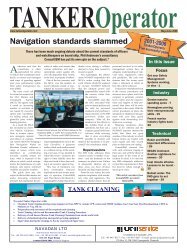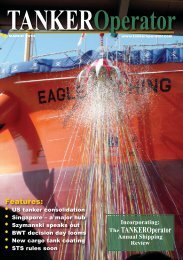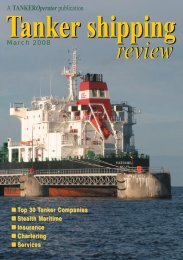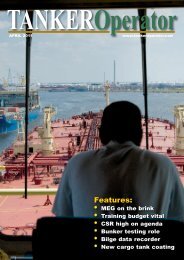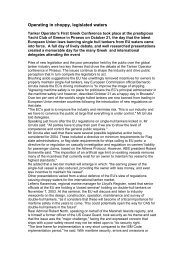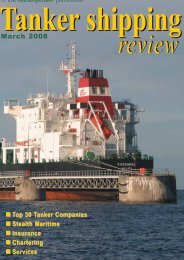Features: - Tanker Operator
Features: - Tanker Operator
Features: - Tanker Operator
Create successful ePaper yourself
Turn your PDF publications into a flip-book with our unique Google optimized e-Paper software.
INDUSTRY - SHIPMANAGEMENT<br />
BSM comes of age<br />
With the ink barely dry on the regrouping programme undertaken by the Bernhard<br />
Schulte Shipmanagement Group (BSM), TANKER<strong>Operator</strong> spoke with ceo Andreas J<br />
Droussiotis about the coming together of the group’s diverse shipmanagement concerns.<br />
BSM is in the big league and currently<br />
manages a fleet of 648 vessels; 285<br />
fully managed and 363 crew<br />
managed and 44 confirmed until the<br />
end of 2008. Furthermore, the group employs over<br />
17,000 personnel on board and onshore.<br />
Droussiotis explained that the whole<br />
purpose of the merger was to protect the<br />
business and invest in a stronger future. "As<br />
with any unification, the systematisation of<br />
the group is taking time with close cooperation,<br />
and a lot of hard work.<br />
Organisations have used acquisitions to reach<br />
new markets and acquire new customers. We<br />
prefer to expand gradually, keeping all<br />
operations under control", he said.<br />
The decision to merge the various companies<br />
was taken by the group as a whole. The<br />
management teams of each concern considered<br />
this as the best solution for the future.<br />
"Merging a group of companies and diverse<br />
cultures under one banner is a challenge, in<br />
addition to a great opportunity. Situations like<br />
this are never easy to deal with. You suddenly<br />
recognise the need to put in place more<br />
effective standards and policies. In order to<br />
achieve this, effective leadership and<br />
teamwork have to be reached on all levels.<br />
"Both the challenge and the opportunity are<br />
there, and by unifying the group of companies,<br />
Bernhard Schulte Shipmanagement plans on<br />
representing just what the power of unity can<br />
Andreas Droussiotis<br />
28<br />
mean in the shipping industry. The result? Being<br />
better for the clients, for the employees and for<br />
the shareholders", Droussiotis said.<br />
Droussiotis explained that the company plans to<br />
manage costs within the integrated group to profit<br />
from opportunities in the shipping industry, while<br />
continuing to provide quality shipmanagement.<br />
"Ultimately, there will be savings; however, we<br />
expect the usage of concentrated power to yield<br />
positive results", he said.<br />
"BSM has a strong management team, with<br />
an established reputation for success. Working<br />
under one banner, the new structure will only<br />
reinforce our efforts to further develop the<br />
opportunities throughout our organisation," he<br />
said talking of the integration of senior<br />
management. New roles have been assumed by<br />
members of the management team, and new<br />
roles were also being made available to cope<br />
with the expansion of the group and the shift in<br />
management roles. "Everyone has taken up<br />
their new roles and they will work fully for the<br />
success of the group", he explained.<br />
All ship management units, which were<br />
previously under the control of the separate<br />
main companies will become fully fledged and<br />
provide all the services to clients directly. Due<br />
to the fleet separation, which was organised for<br />
various reasons, they will report to the group<br />
fleet directors for the different vessels who will<br />
be responsible for their operations.<br />
As a result of the coming together, BSM's<br />
clients' fleet are now managed by strategically<br />
located service delivery centres (SDCs)<br />
around the globe. "These have the specialist<br />
knowledge, the experience, the up-to-date<br />
systems and certifications in place to manage<br />
all types of vessel and fleet currently in<br />
service with maximum efficiency", he said.<br />
He said that from containerships,<br />
conventional bulkers, gravity-fed self-unloading<br />
bulk carriers, through Panamax, post-Panamax,<br />
Handysize, ro-ros, pure car carriers, crude,<br />
chemical, LNG, or LPG tankers, to heavy-lift<br />
vessels, semi-submersibles and FPSOs - the on<br />
board and onshore specialists are highly<br />
experienced in managing vessels and fleets of<br />
every type and age.<br />
Basically, the fleet has been divided into<br />
three categories - dry, tanker, gas/LNG and<br />
each category is managed by a team headed<br />
by a group managing director.<br />
Droussiotis said that the most important<br />
issue for BSM was nothing else but the<br />
continuous training and upgrading of its own<br />
people. The majority of people in BSM's<br />
present training facilities/schools come from<br />
the Philippines, Cyprus, India, and to a lesser<br />
extent, the ex Soviet states.<br />
"Our foundations stand by the principle to<br />
own the agencies we recruit from. We have<br />
the company's policies, philosophy, mentality<br />
and recruiting standards within these agencies,<br />
as well as the training we conduct in these<br />
areas", he explained.<br />
He said that building relationship and<br />
professional networks were just some of the<br />
elements that keep the shipping industry on its<br />
toes. Leadership, collaboration,<br />
communication; these are aspects that are<br />
needed to keep the human factor from<br />
growing stagnant. It is the human factor issues<br />
that are capable of acting as catalysts in<br />
developing technologies, expansion rates, and<br />
so on. "However, with strict follow-up of the<br />
policies, we are able to cope with the<br />
immense problem, as well as with the<br />
unreasonable escalation of wages, which we<br />
try hard to cope with", he said.<br />
As for specialist vessels, Droussiotis said<br />
that over the years, the group has managed a<br />
large number of gas and chemical vessels.<br />
The shipmanagement units are capable of<br />
providing experienced crews for these vessels<br />
from the BSM pool with the guidance and<br />
control of the group managing directors.<br />
"We have a number of our seafarers, both<br />
officers and ratings, who have been with us for<br />
over 10 years; a good number who have been<br />
with us over 15-20 years. Dependable seafarers<br />
are harder to come by today; which is exactly<br />
why we work harder to keep them. We have a<br />
good number of senior officers who started as<br />
ratings with us, meaning we have been satisfied<br />
with their performance and they have been<br />
pleased with us as employers", he said.<br />
As for Hamburg, Droussiotis said that<br />
Bernhard Schulte's role in the group today is like<br />
in the past- that is the role of the shareholders.<br />
There is close co-operation and an information<br />
flow, but the company is not involved in BSM<br />
operations at all, he stressed.<br />
TO<br />
TANKER<strong>Operator</strong> � August/September 2008



